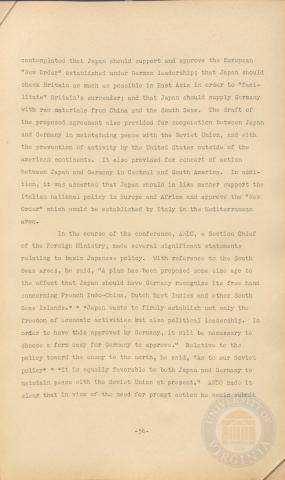
Page 56
| Parent | Japanese - German - Italian Collaboration |
|---|---|
| Date | |
| Language | English |
| Collection | Tavenner Papers & IMTFE Official Records |
| Box | Box 14 |
| Folder | Japan, Germany, Italy Collaboration and Introduction |
| Repository | University of Virginia Law Library |
contemplated that Japan should support and approve the European "New Order" established under German leadership; that Japan should check Britain as much as possible in East Asia in order to "faci¬litate" Britain's surrender; and that Japan should supply Germany with raw materials from China and the South Seas. The draft of the proposed agreement also provided for cooperation between Japan and Germany in maintaining peace with the Soviet Union, and with the prevention of activity by the United States outside of the American continents. It also provided for concert of action between Japan and Germany in Central and South America. In addi¬tion, it was asserted that Japan should in like manner support the Italian national policy in Europe and Africa and approve the "New Order" which would be established by Italy in the Mediterranean area.
In the course of the conference, ANDO, a Section Chief of the Foreign Ministry, made several significant statements relating to basic Japanese policy. With reference to the South Seas areas, he said, "A plan has been proposed some time ago to the effect that Japan should have Germany recognize its free hand concerning French Indo-China, Dutch East Indies and other South Seas Islands.* * *Japan wants to firmly establish not only the freedom of economic activities but also political leadership. In
order to have this approved by Germany, it will be necessary to choose a form easy for Germany to approve." Relative to the policy toward the enemy to the north, he said, "As to our Soviet policy* * *it is equally favorable to both Japan and Germany to maintain peace with the Soviet Union at present." ANDO made it clear that in view of the need for prompt action he would submit
